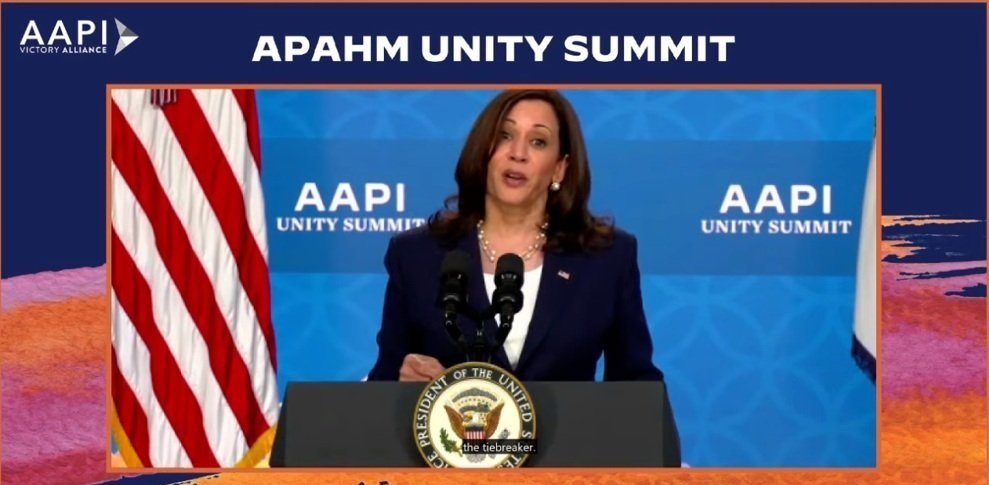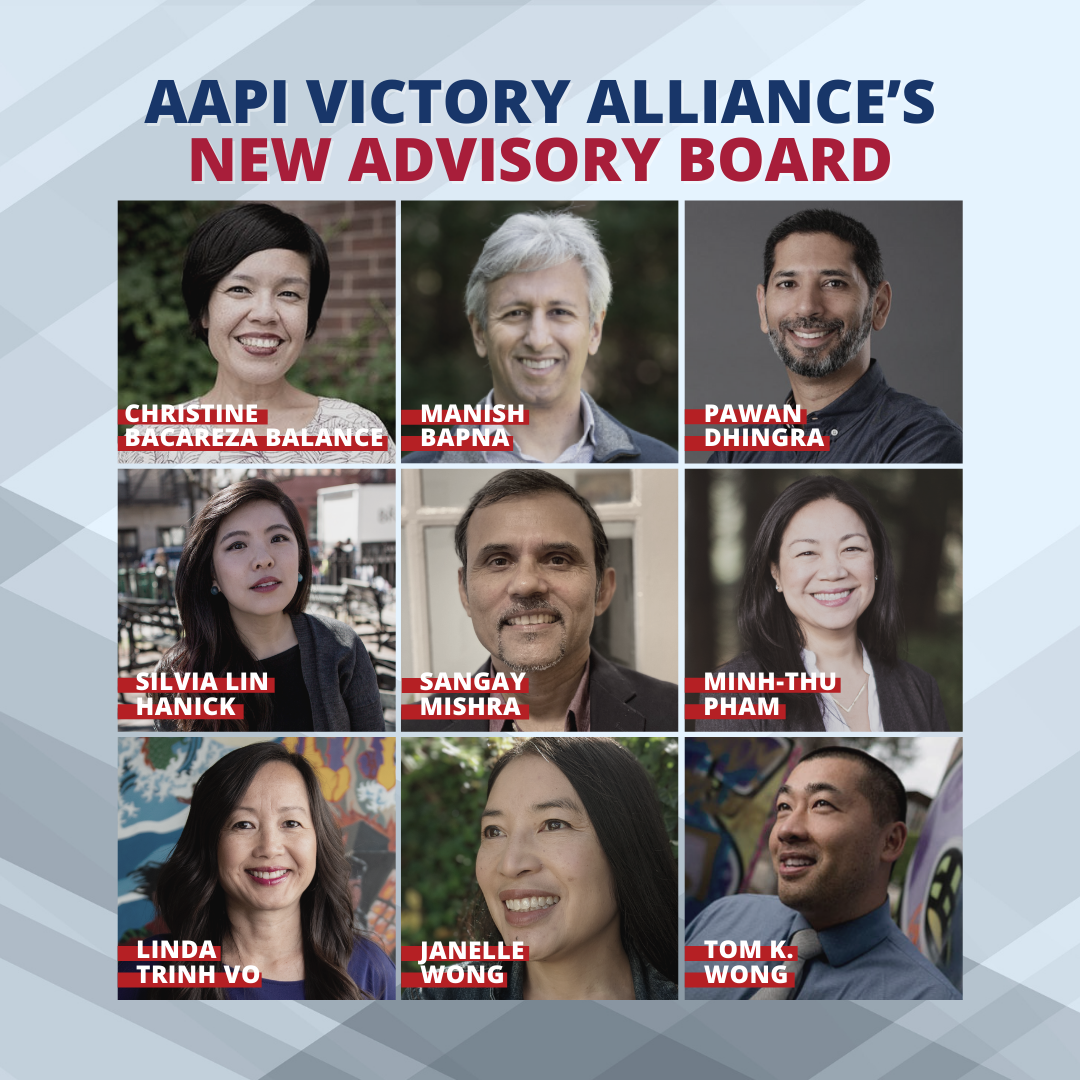#AAPIMovement: Crucial Moments from 2021
In another year marked by the Covid-19 pandemic, the Asian American and Pacific Islander (AAPI) community and the AAPI Victory Alliance have continued our fight against xenophobia and the fight for political power. We have empowered our community by keeping each other safe and speaking boldly on the issues that matter to us.
Let’s take a look back at our crucial moments of 2021.
“As we emerge from the pandemic, I believe that we are at the start of a new era. I believe we have a unique opportunity to shape our nation’s future, to transform how we live, how we work, and how we vote, for the better,” said Vice President Kamala Harris at the APAHM Unity Summit. She highlighted how important it was for all communities to come together in solidarity amid increasing anti-AAPI hate incidents, and spoke out against anti-voting legislations.
The Summit also featured Sens. Mazie Hirono, Ben Ray Luján, Cory Booker, Tammy Duckworth, Alex Padilla as well as TV personality Tan France, and it was followed by a Summit After Party with speakers Hillary Rodham Clinton, Lisa Ling, Richard Verma and Simu Liu.
APAHM 2021 was a celebration of the resilience of our community and a clear reminder that when AAPIs band together, unified in our demands for a more equitable government, we can create sweeping change. Watch the full Summit here.
AAPI Victory Alliance launched the first-ever AAPI think tank, an AAPI Ambassadors program, and announced a slew of new board members and advisory council members. Additionally, Executive Director Varun Nikore, Founding President of the AAPI Victory Fund, has transitioned to a full-time position at AAPI Victory Alliance.
The think tank focuses on cultivating actionable policies, rooted in data, that impact the AAPI community. It works towards harnessing the momentum of our community coming off of the 2020 election by creating and advocating for crucial policies; educating and organizing around progressive issues and candidates; and building alliances to help AAPIs exert their political power.
The inaugural cohort of AAPI Ambassadors is a passionate group of influential AAPIs eager to mobilize the rapidly growing AAPI electorate and advocate on behalf of issues at the forefront of the AAPI community like voting rights, gun violence prevention, mis/disinformation and climate change.
The new board members have all demonstrated a commitment to elevating AAPI voices and causes in their fields. Jeff Yang, Lala Wu, Ankur Goel, Sima Ladjevardian, and Katie Kalvoda have joined AAPI Victory Alliance as board members, and new think tank advisory council members include Christine Bacareza Balance, Pawan Dhingra, Minh-Thu Pham, and Tom K. Wong, among others.
AAPIs have made unprecedented strides in political representation this year, with AAPI Mayors elected to 3 major cities, wins in various elections and several nominations to the Biden-Harris administration. Mayors Michelle Wu, Aftab Pureval, and Bruce Harrell have broken multiple glass ceilings with their wins in Boston, Cincinnati, and Seattle respectively. Five Asian Americans were elected to the New York City Council, including the first Muslim woman, the first Korean Americans, and the first South Asian Americans. And although President Biden did not include any AAPIs in his Cabinet -- a first time in a Presidential Cabinet in the past two decades -- he has appointed several AAPIs to top positions within the Administration.
Among the notable appointments are: Ambassador Katherine Tai as U.S. Trade Representative; Neera Tanden as White House Staff Secretary; Gautam Raghavan as the Director of the Office of Presidential Personnel; Ambassador Chris Lu as U.S. Representative to the United Nations for Management and Reform; Michelle Kwan as Ambassador to Belize (nominated); Julie Su as Deputy Secretary of the Department of Labor; Kiran Ahuja as the Director of Office of Personnel Management; Vanita Gupta as the Associate Attorney General; Seema Nanda as the Solicitor of Labor; Erika L. Moritsugu as the Deputy Assistant to the President and AAPI Senior Liaison; and Sima Ladjevardian as an HHS Regional Director.
Notable judicial confirmations include: Lucy Koh, the first Korean American woman federal appellate judge; Jennifer Sung, the first Asian American to serve on the U.S. Court of Appeals for the Ninth Circuit in Oregon; Zahid Quraishi, the first Muslim American federal judge in U.S. history; Tana Lin, the first Asian American federal judge in Washington State; Regina Rodriguez, the first Asian American federal judge in Colorado; and Florence Y. Pan, the first Asian American woman federal judge for the District of Columbia.
President Joe Biden reestablished the White House Initiative on Asian Americans, Native Hawaiians, and Pacific Islanders (WHIAANHPI) during APAHM 2021 after a push from AAPI Victory Alliance; announced Initiative co-chair Ambassador Katherine Tai; and appointed community leaders to the President's Advisory Commission on Asian Americans, Native Hawaiians, and Pacific Islanders.
In our memorandum to the White House, we urged for a deeper and bolder commitment to elevating AAPI success, issues, and racial disparities. Since many of these issues cannot sit in one agency, we requested dedicated staff centrally that could effectively coordinate with the Domestic Policy Council, Office of Communications, National Security Council, and Office of Public Engagement in a manner that reflects this moment in time, needed velocity for change and targeted policies to enact and implement.
WHIAANHPI is being spearheaded by executive director Krystal Ka’ai and co-chairs HHS Secretary Xavier Becerra and U.S. Trade Representative Ambassador Katherine Tai.
AAPI Victory Alliance congratulates the newly appointed commissioners on the President's Advisory Commission on Asian Americans, Native Hawaiians, and Pacific Islanders, including our own Board Vice Chair Luisa Blue. As an organization that held a public call for diverse candidates, we commend the diversity of this class of commissioners who represent the vibrancy of AAPIs across the country. These commissioners represent diverse sectors from business to nonprofits, health, education, and more, which will ensure the Commission is a bridge to the community.
2021 has tragically become the deadliest year for gun violence in decades. We mourn the deaths of six Asian American women in the Atlanta spa killings, and of four Sikh Americans killed at the Indianapolis FedEx facility, in addition to over 15,000 lives lost to gun violence this year.
AAPIs have become a target market for the gun industry since the spike of hate crimes, as we look for ways to keep ourselves safe. Gun sales and ownership have skyrocketed since the beginning of the pandemic, as have the number of mass shootings. To make our community aware of the deadly risk of gun violence and ways to prevent more violence, we hosted two Gun Violence Prevention webinars: Why Gun Violence Prevention Matters to AAPIs and The Voices of Survivors and Where We Go From Here.
According to the 2020 Census, AAPIs are the fastest growing demographic in the country. With a whopping 27% growth in the last decade, we are at 23.2 mllion strong now. In Loudon, VA, the AAPI population increased by 86%, in Montgomery, TX, the growth rate was 106% and Forsyth, GA saw a 232% growth.
Needless to say, our political power is growing. We had a 47% voter turnout increase between 2020 and 2016, and became the margin of victory for President Biden in many crucial states. At AAPI Victory Alliance, we are committed to harnessing the full power of our community to create positive change in America. In 2021, we rallied our community to use our collective voices, with events like AAPI Victory in Virginia and Florida, AAPI Data Panel, Combatting Misinformation & Disinformation Online, and Funding for 501(c)(3) and 501(c)(4) organizations.
AAPI Victory Alliance’s work is more important now than ever, as we face an uphill battle going into the 2022 midterm elections, where AAPI voters can once again be the margin of victory. Misinformation and disinformation are plaguing our communities, our civil rights are at stake, our reproductive freedom and voting rights are under attack, and the virus of racism continues to plague our community.
We are going into 2022 with hope and a strong belief in the resilience of our community and our commitment to building America back better.






